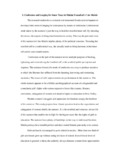Please use this identifier to cite or link to this item:
https://elibrary.tucl.edu.np/handle/123456789/3214| Title: | Constructive Role of Confession in Yousafzai'sI Am Malala |
| Authors: | Panta, Pratikshya |
| Keywords: | autobiography;girls education |
| Issue Date: | 2019 |
| Publisher: | Central Department of English |
| Abstract: | The thrust of this thesis is how confessional mode turns out to be a style of choice that paves the way for the liberation of a troubled, tortured and tormented self in Yousafzai's I Am Malala. Mobilizing the notion of autobiography as a dynamic representation of self in transition as well as confinement, the study is done by carefuly examining and analyzing relevant details and textual evidences. It explores its own past through the reconstruction of mental images preserved in the memory. It furthermore explores the writer’s own memoir from the first person narrative point of view. Psychic restlessness, intense inner agony and the burden of guilt put pressure on the narrator to follow on the track of confession. The constructive role of confession is probed by using the autobiography theories of Linda Anderson, Siddionie Smith and Julie Watson. The narrator is compelled to raise voice against the ban on the rights of girls to education. The suppression of the voices of women in Islamic society is one of the most callous practices the narrator hates a lot. She vociferously asks for the extension of the right of girls to education. For the cultivation of civilized society within the Islamic zone, it is necessary to allow women to have say in overall sectors. For daring to cross the limits and boundary set by patriarchy, the narrator is shot in her head and luckily she is saved. |
| URI: | http://elibrary.tucl.edu.np/handle/123456789/3214 |
| Appears in Collections: | English |
Files in This Item:
| File | Description | Size | Format | |
|---|---|---|---|---|
| COVER.pdf | 61.07 kB | Adobe PDF |  View/Open | |
| chapter.pdf | 124.03 kB | Adobe PDF |  View/Open |
Items in DSpace are protected by copyright, with all rights reserved, unless otherwise indicated.
